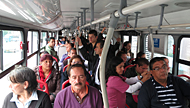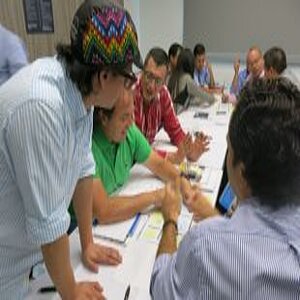Developing transport NAMAs
On the occasion of the UNFCCC Climate Change Conference in Durban, the Development Bank of Latin America (CAF) and the Deutsche Gesellschaft für Internationale Zusammenarbeit (GIZ) GmbH signed a memorandum of understanding on the joint provision of support to national governments in Latin America for developing and implementing nationally appropriate mitigation actions (NAMAs) in the transport sector. The International Climate Initiative (ICI) is contributing via the TRANSfer project.
On the occasion of the UNFCCC Climate Change Conference in Durban, the Development Bank of Latin America (CAF) and the Deutsche Gesellschaft für Internationale Zusammenarbeit (GIZ) GmbH signed a memorandum of understanding on the joint provision of support to national governments in Latin America for developing and implementing nationally appropriate mitigation actions (NAMAs) in the transport sector. The International Climate Initiative (ICI) is contributing via the TRANSfer project.
Economic growth in developing countries is causing a sharp rise in their transport-related greenhouse gas emissions. 'Avoid - Shift - Improve' approaches are cost-effective ways to reduce these emissions. There is great interest in many countries in such mitigation approaches and technologies. What is often lacking locally, however, is practical knowledge and the capability to identify, measure and implement mitigation measures in the transport sector. It is this gap that the TRANSfer project aims to close.
As a part of the project, a working group charged with developing transport NAMAs has been set up; this group has engaged in intense exchange with a range of experts in Colombia's private sector and policy-making circles. Similar activities have been under way in South Africa and Indonesia. A handbook will be produced that compiles the outcomes of case studies, delivering general information on mitigation actions and on the design of NAMAs in the transport sector. The experience gained in the pilot countries is transmitted to other countries and is disseminated widely via the internet and events such as the Climate Change Conferences. Durban was a good example: prior to signing the memorandum of understanding, the TRANSfer project convened a side event on challenges and solutions in the development and implementation of transport NAMAs. Colombia's vice minister of transport, Filipe Targa, who attended the side event, noted that his government is investing public resources amounting to 500 million US dollars in a fund dedicated to improving the commercial vehicle fleet; the private sector is matching this pledge with a further 500 million US dollars. This is one the largest financial commitments made to date by a developing country to the implementation of NAMAs worldwide.
Actions to promote sustainable, low-emission transport not only mitigate climate change, but also have other positive long-term effects such as improved energy security, greater mobility of disadvantaged groups, increased attractiveness to investors, and better transport safety and air quality.
The link has been copied to the clipboard
Contact
IKI Office
Zukunft – Umwelt – Gesellschaft (ZUG) gGmbH
Stresemannstraße 69-71
10963 Berlin




